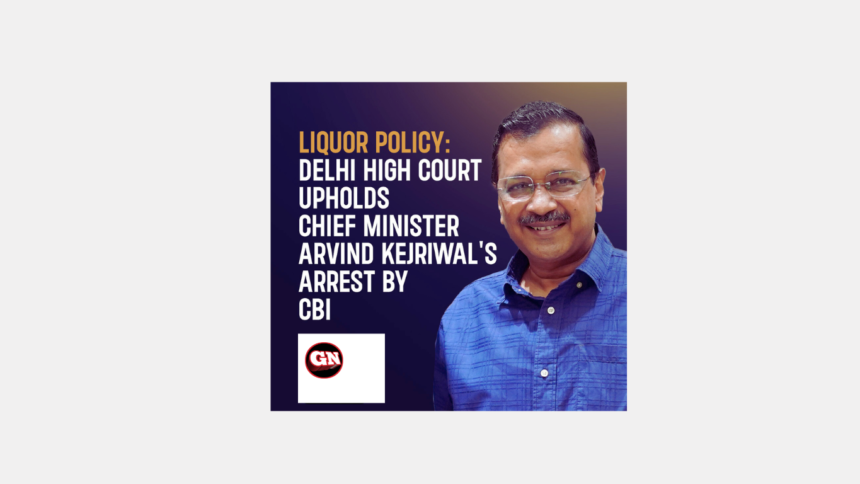Liquor Policy.
On Monday, the Delhi High Court denied Chief Minister Arvind Kejriwal’s appeal against his detention by the CBI in connection with a purported liquor policy scandal. Along with dismissing the temporary bail plea, the high court allowed the parties to go before the trial court.
It is impossible to claim that there was no lawful basis for the arrest. Regarding the bail application, it is handled with the freedom to go before the trial court, the high court decided.
Kejriwal’s interim petition against his CBI detention was denied by a bench of Justice Neena Bansal Krishna.
In the Excise Liquor policy case, the incarcerated Delhi Chief Minister Arvind Kejriwal filed a routine bail petition. The Delhi High Court had postponed a decision in this matter until last week. The decision about regular bail has not yet been made public.
In opposition to Kejriwal’s request for bail, the CBI declared that it had completed the chargesheet and was prepared to start the trial. Kejriwal signed the New Excise Policy and is the head of cabinet, according to the CBI’s legal representative. Senior Attorney Abhishek Manu Singhvi, who was representing Kejriwal, countered that as long as Kejriwal remains the mastermind and LG VK Saxena signed the policy, he should be included in the case as well. The CBI’s legal representative countered that Singhvi was attempting to sensationalise the situation.
Kejriwal’s request for temporary bail and his opposition to the CBI’s detention were the subject of a reserved ruling by the Delhi High Court on July 17. Today, the decision was rendered.
Arvind Kejriwal is the brains behind the alleged Delhi Liquor Policy case, according to the CBI’s attorney, who argued before the high court. Vijay Nair, the primary accused, was nominated to the secretariat along with other ministers.

According to the CBI’s legal representative, the High Court may consider bail matters directly in some situations, but it cannot serve as the initial court to hear bail cases.
Furthermore, the CBI informed the court that money was utilized in the Goa elections and that a money trail totaling Rs 44 crores had been produced.
Singhvi countered that hearsay serves as the foundation for the majority of the statements made in the case. Singhvi, who represented Kejriwal at the prior hearing, referred to the CBI arrest as an insurance arrest. He had maintained that the CBI had detained Kejriwal from Tihar Jail, where he was already incarcerated, after realizing he would leave the PMLA case brought by the Enforcement Directorate.
The Delhi Liquor Policy case, which involves the ED, has led the Supreme Court to give Kejriwal temporary release. Due to the CBI’s case against him, he is currently incarcerated.
The Chief Minister is not entitled to bail, Singh further said, merely because the CBI filed a chargesheet against Kejriwal today. He claimed that despite a chargesheet being filed against them, bail has been refused to co-accused Manish Sisodia and K Kavitha.
The term “insurance arrest” was not warranted, according to his statements. Despite numerous petitions and applications being filed with the court, he contended that no findings of CBI violations had been made until yet.
Singh said that it is required by Delhi Prison Rules to obtain court authorization before questioning someone who is in court custody, which addressed the issue of not giving Kejriwal notice. According to him, Kejriwal does not need to be notified in advance by CBI.
Instead of going through the trial court, Kejriwal went straight to the High Court and requested bail. In connection with the alleged scheme, he is being held in detention for corruption and money laundering.
Kejriwal’s plea contesting the Enforcement Directorate’s (ED) arrest was recently granted interim release by the Supreme Court, which also referred the issue to a higher bench.

Examined by the CBI, the Chief Minister was detained in Tihar. His bail in the PMLA case had been stopped by the Delhi High Court just hours prior. Kejriwal was formally arrested in this case on June 26 after the CBI searched him in court with the consent of the court.
The ED detained Kejriwal on March 21. Ahead of the general elections in June, the Supreme Court granted him temporary bail in May. On June 2, he gave himself up.
Justice Neena Bansal Krishna.
Liquor Policy.
Kejriwal was granted permission to petition the trial court for relief after Justice Neena Bansal Krishna denied his bail request.
The court ruled that there is no evidence to suggest that the arrest was unlawful or made without a legitimate basis.
For Kejriwal, senior advocates Abhishek Manu Singhvi, N Hariharan, and Ramesh Gupta made an appearance. Singh, CBI SPP, was the probe agency’s representative.
In response to the Supreme Court’s interim bail decision in the ED case, Singhvi said that Kejriwal’s detention in the CBI case is a “insurance arrest.”

